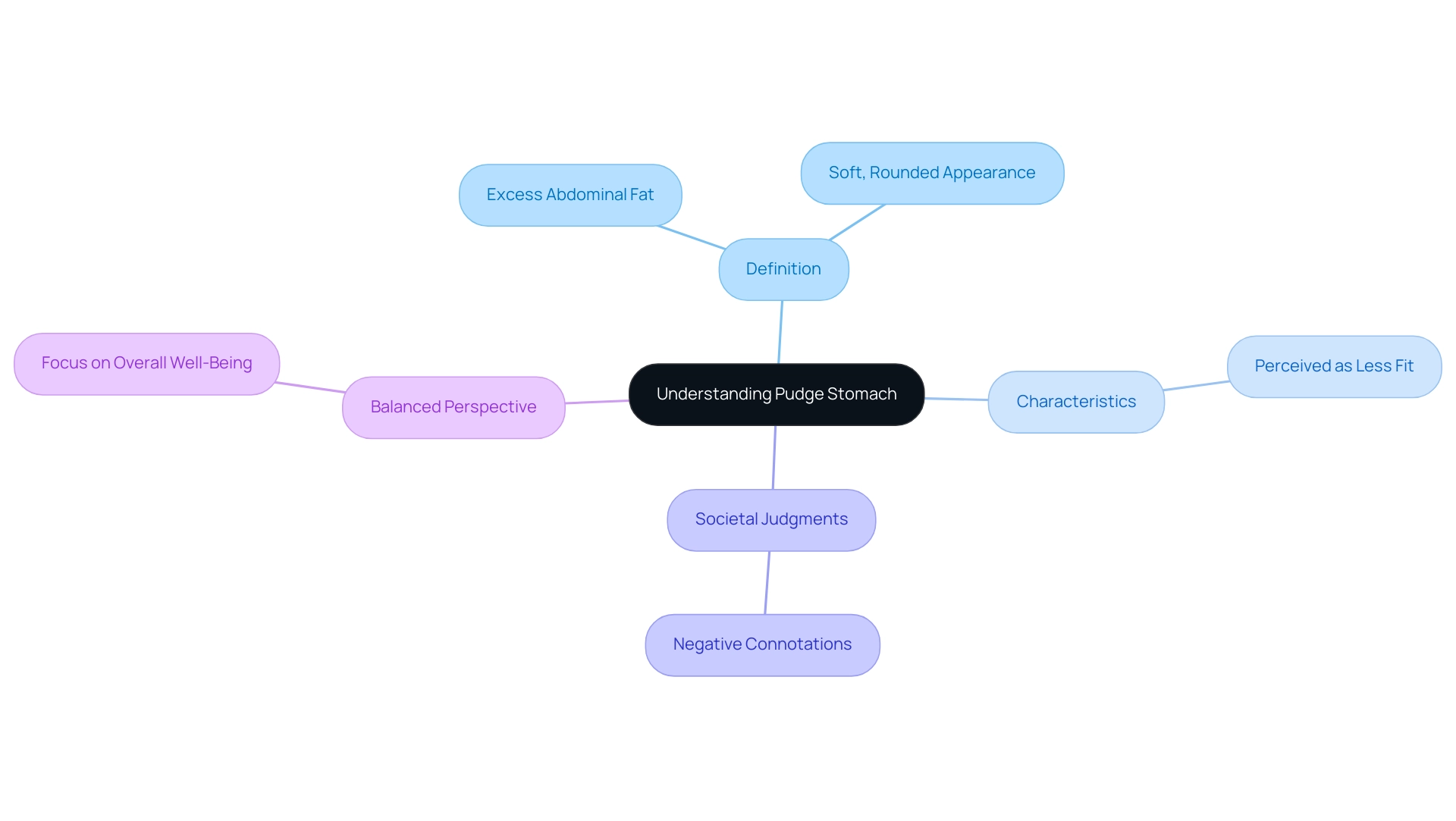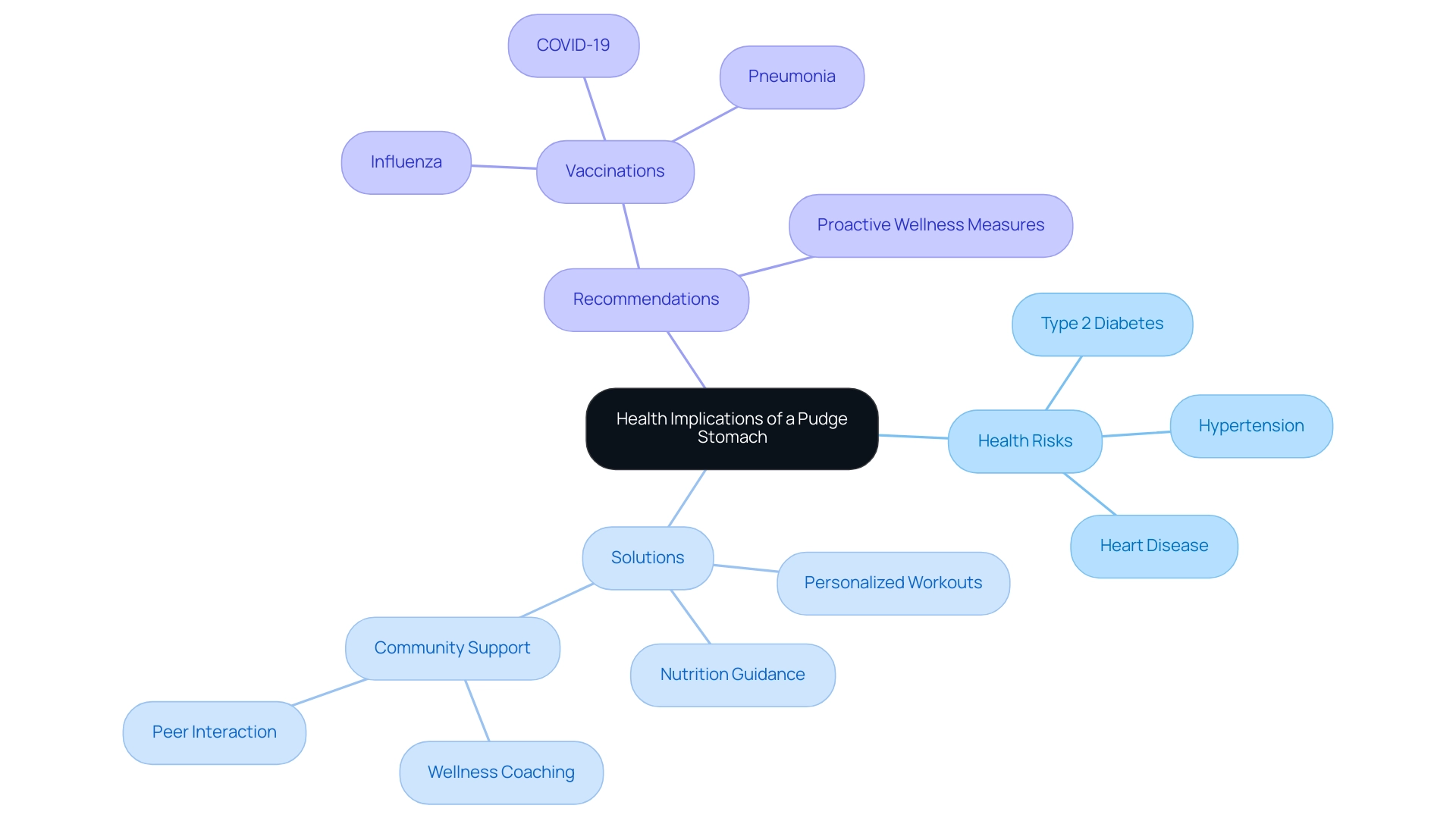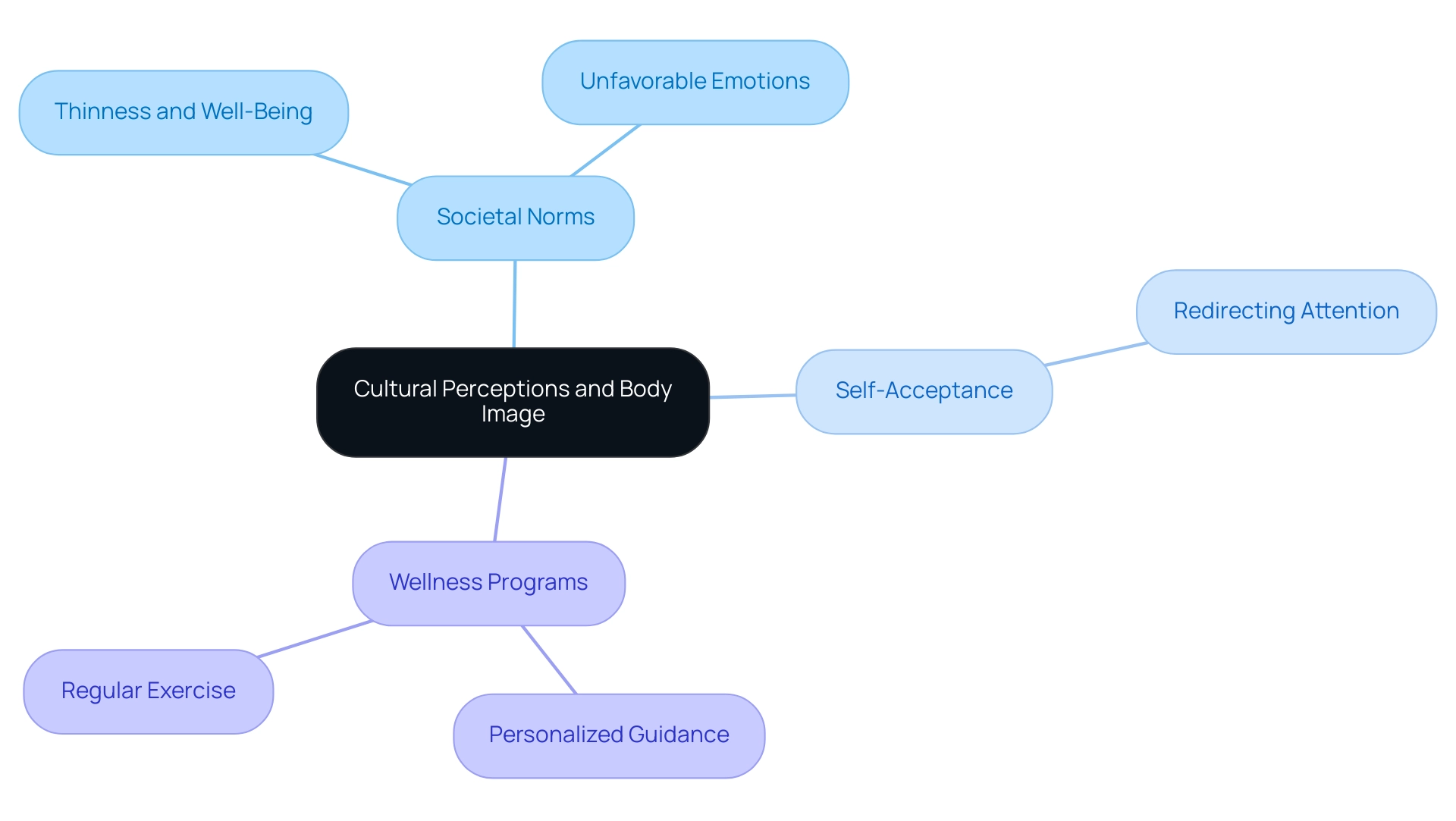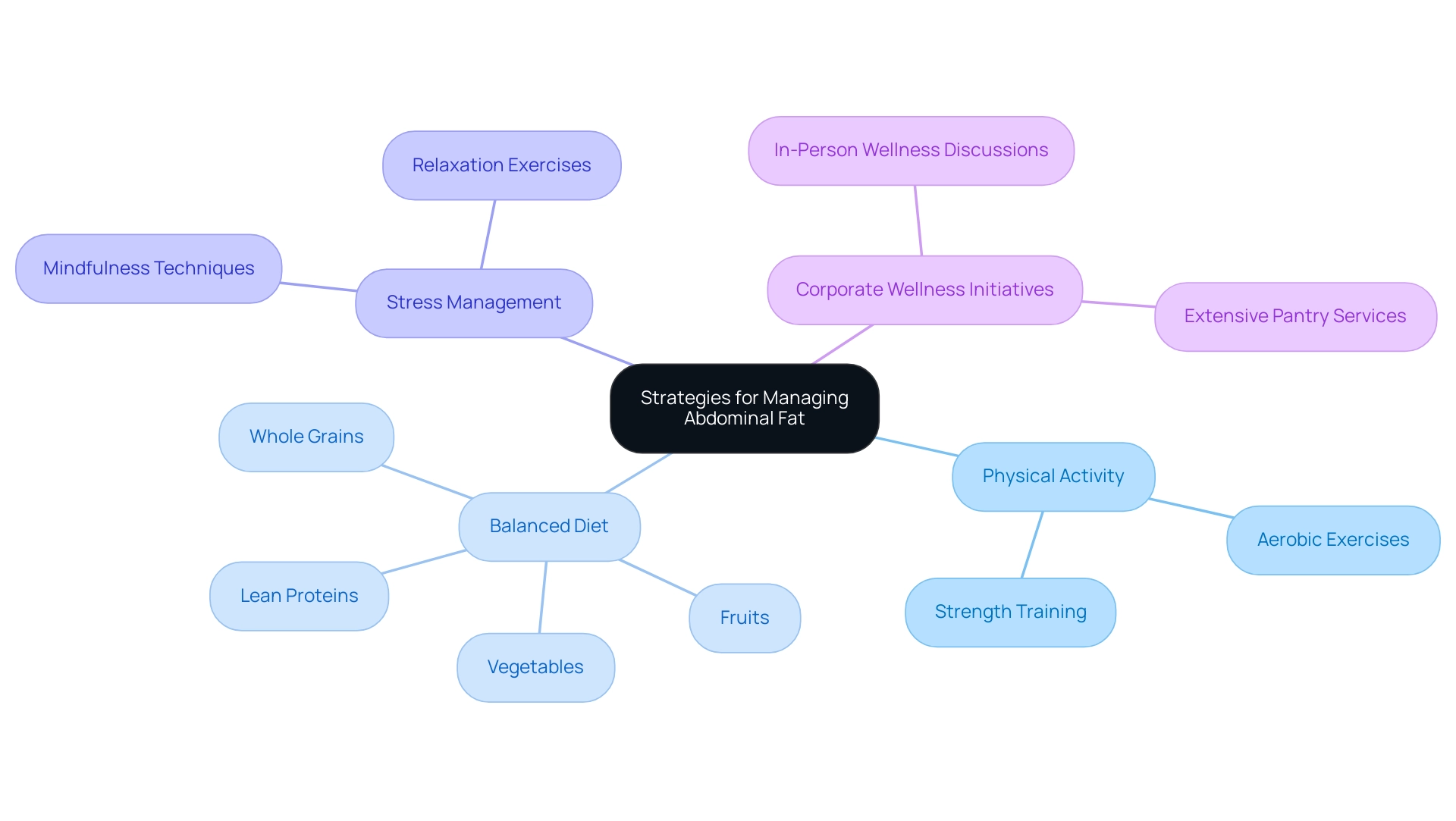Introduction
In a world where health and body image are often scrutinized, understanding the concept of a "pudge stomach" becomes essential for fostering a positive self-image and promoting overall well-being. This term, which describes excess abdominal fat, carries with it a host of societal perceptions that can impact individuals' health journeys. Recognizing the health implications tied to abdominal fat is crucial, as it is linked to serious conditions such as type 2 diabetes and heart disease.
However, beyond the numbers and risks lies an opportunity for transformation. By embracing a holistic approach to health that prioritizes lifestyle changes, organizations can empower their teams to cultivate healthier habits and foster a supportive workplace culture. Through personalized coaching and wellness programs, individuals can shift their focus from societal expectations to personal health goals, ultimately enhancing both productivity and satisfaction in their professional lives.
Defining Pudge Stomach: What Does It Mean?
The term 'pudge stomach' refers to a common description of excess abdominal fat, often characterized by a soft, rounded appearance of the stomach area. This term is frequently linked to a physique that may be perceived as less fit or healthy, leading to various societal judgments.
It's important to note that while the term can carry negative connotations, it is essential to approach body image with a balanced perspective. Comprehending the nuances of this term can assist people in navigating their self-image and wellness objectives more effectively, promoting a focus on overall well-being rather than just appearance.

Health Implications of a Pudge Stomach: Risks and Considerations
Excess abdominal fat poses significant risks to well-being, particularly regarding cardiovascular condition and metabolic function. Research indicates that people with a pudge stomach are 3 to 5 times more likely to develop type 2 diabetes than those maintaining a healthy weight. Furthermore, this excess fat can greatly increase the likelihood of hypertension and heart disease, negatively impacting overall physical performance and energy levels—both essential for maintaining workplace productivity and morale.
Comprehending these risks is essential for improving wellness and well-being. By recognizing the implications of abdominal obesity, people can be inspired to make healthier lifestyle changes. Our wellness coaching app provides a comprehensive solution, featuring:
- Personalized workouts
- Nutrition guidance
- Daily programming to help your team achieve their wellness goals efficiently
With video demonstrations available, users can easily follow along and learn exercises, enhancing their workout experience. The capability to connect directly with wellness coaches offers motivation and support, while the community aspect enables participants to interact with like-minded peers, fostering encouragement and accountability.
Regular physical activity and balanced nutrition are vital steps toward improving quality of life. The American Heart Association emphasizes the significance of proactive wellness measures, including vaccinations against influenza and COVID-19 for those with cardiovascular risk factors. This recommendation aligns with findings from a case study titled 'Vaccination and Heart Health,' underscoring the need for preventive action.
By motivating oneself and others to adopt these changes, HR Benefits Managers can cultivate a healthier, more vibrant workplace culture.

Cultural Perceptions and Body Image
Cultural perceptions of body image significantly influence how individuals perceive themselves and their well-being. The phrase 'pudge stomach' frequently brings about unfavorable emotions, mirroring societal norms that associate thinness with well-being. However, it is essential to recognize that well-being is a complex interplay of various factors, including genetics, lifestyle, and mental wellness.
Encouraging self-acceptance and positivity can assist individuals in redirecting their attention from adhering to societal standards to valuing their well-being and happiness. By investing in personalized guidance and wellness programs, organizations can empower employees to make lasting lifestyle changes that enhance their well-being.
For example, one client mentioned, 'The tailored guidance I obtained assisted me in comprehending my physical self more effectively and emphasizing my well-being over societal expectations.' Furthermore, experienced coaches utilize evidence-based techniques such as cognitive behavioral strategies and motivational interviewing to facilitate meaningful lifestyle changes.
Encouraging regular exercise not only improves motivation and cognitive abilities but also fosters a healthy workplace culture that values diversity in body shapes and sizes. Such an inclusive environment ultimately benefits overall employee well-being, enhancing productivity and satisfaction within the team.
Reach out to us today to discover how our training programs can assist your organization in fostering wellness among your employees!

Strategies for Managing Abdominal Fat
Managing abdominal fat involves a combination of lifestyle changes and healthy habits, which are central to Foresight Health Coaching's approach. Key strategies include:
-
Engaging in regular physical activity, such as:
- Aerobic exercises
- Strength training
These activities help to burn calories and build muscle.
-
Embracing a balanced diet abundant in:
- Fruits
- Vegetables
- Lean proteins
- Whole grains
This aids in weight management and overall well-being.
Foresight's tailored training programs, delivered through an interactive app, simplify this process by providing customized plans and expert guidance. The app also features functionalities that enhance user experience, including:
- Tracking progress
- Accessing a community of support
Incorporating stress management techniques, such as mindfulness and relaxation exercises, is crucial, as stress can contribute to weight gain, particularly in the abdominal area.
Additionally, Foresight provides corporate wellness initiatives that feature:
- In-person wellness discussions
- Extensive pantry services
These initiatives guarantee that HR professionals can improve employee well-being, productivity, and confidence. The flexibility of corporate memberships allows for scalability based on the number of employees, making it an effective solution for fostering a more fulfilling workplace environment.
With founders Paul and Chris bringing over 2.5 years of high-performance coaching, their expertise adds credibility to the coaching services, ensuring a holistic approach to health and wellness.

Conclusion
Understanding the implications of a "pudge stomach" goes beyond mere aesthetics; it touches on significant health concerns that can affect productivity and overall well-being. Recognizing the health risks associated with excess abdominal fat, such as type 2 diabetes and heart disease, is crucial for individuals and organizations alike. By fostering a culture of health through personalized coaching and wellness programs, employees can shift their focus from societal pressures to meaningful health goals.
Cultural perceptions of body image play a fundamental role in shaping self-esteem and personal health journeys. Embracing body positivity and encouraging diversity in body shapes fosters an inclusive workplace environment that enhances morale and productivity. Organizations that prioritize health and well-being empower their teams to adopt healthier lifestyles, ultimately leading to greater satisfaction and engagement at work.
Implementing effective strategies for managing abdominal fat is essential for promoting long-term health. By integrating regular physical activity, balanced nutrition, and stress management into daily routines, individuals can take proactive steps toward a healthier future. With the support of innovative wellness programs, HR Benefits Managers can cultivate a thriving workplace culture that values health and encourages every employee to reach their full potential.
Now is the time to take action and invest in the well-being of your team—because a healthier workplace is a more productive and happier one.
Frequently Asked Questions
What does the term "pudge stomach" refer to?
The term "pudge stomach" refers to excess abdominal fat, often characterized by a soft, rounded appearance of the stomach area. It is commonly associated with a physique perceived as less fit or healthy.
What are the societal perceptions associated with having a pudge stomach?
Societal perceptions often link a pudge stomach to negative judgments about fitness and health, which can impact an individual's self-image. It is important to approach body image with a balanced perspective, focusing on overall well-being rather than just appearance.
What health risks are associated with excess abdominal fat?
Excess abdominal fat poses significant health risks, including a higher likelihood of developing type 2 diabetes (3 to 5 times more likely), hypertension, and heart disease. It also negatively impacts physical performance and energy levels.
How can individuals improve their wellness in relation to abdominal fat?
Individuals can improve their wellness by engaging in regular physical activity, embracing a balanced diet, and utilizing wellness coaching programs that offer personalized workouts, nutrition guidance, and daily programming.
What role does cultural perception play in body image and well-being?
Cultural perceptions significantly influence how individuals view themselves. The phrase "pudge stomach" can evoke unfavorable emotions due to societal norms that associate thinness with well-being. Recognizing that well-being involves various factors, including genetics and mental wellness, is crucial for self-acceptance.
How can organizations support employees in making healthier lifestyle changes?
Organizations can support employees by investing in personalized guidance and wellness programs. This includes offering tailored coaching, promoting regular exercise, and fostering an inclusive workplace culture that values diversity in body shapes and sizes.
What strategies are effective for managing abdominal fat?
Effective strategies for managing abdominal fat include engaging in regular physical activity (aerobic exercises and strength training), embracing a balanced diet rich in fruits, vegetables, lean proteins, and whole grains, and incorporating stress management techniques like mindfulness.
What resources does Foresight Health Coaching provide for individuals seeking to manage their abdominal fat?
Foresight Health Coaching provides an interactive app that offers customized training programs, tracks progress, and connects users with a supportive community. They also offer corporate wellness initiatives that include in-person discussions and pantry services to enhance employee well-being.

